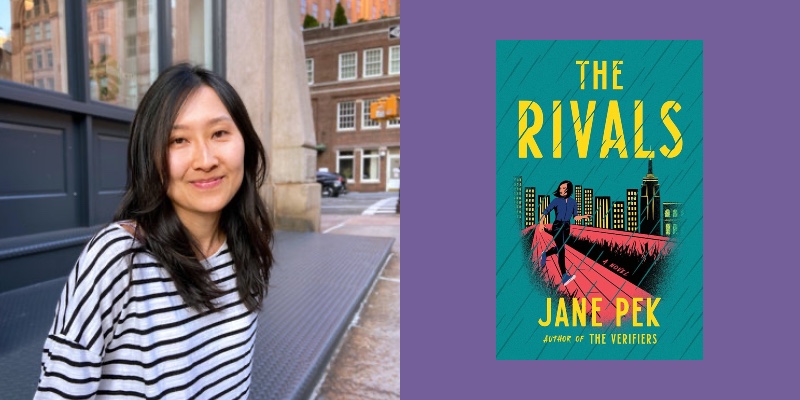Jane Pek’s The Verifiers, a mystery built around dating apps and AI, established her as a writer to watch when it came out in 2022. In it, mystery-obsessed Claudia Lin and her coworkers at a dating detective agency, the titular “verifiers,” investigate the backgrounds of the dates their clients find through algorithm-driven matchmakers. As they stake out significant others, Claudia and her colleagues uncover a vast AI conspiracy that already led to one murder.
In The Rivals, her sequel out this month, Claudia convinces an employee at a matchmaker to share information proving the powerful dating platforms are mining their users’ data to create bots that manipulate their subscribers. It’s a take on the spy novel that further cements Pek as a rising star in the crime genre.
Here, Pek reflects on writing a meta mystery, creating a unique sleuth and more. Our conversation has been condensed and edited for clarity.
Claudia is one of my favorite fictional detectives. She’s such a distinct character. How did you go about creating her?
Claudia was not the original protagonist of the novel. I first came up with the premise of a dating detective agency that would solve cases. Then, I needed a protagonist. I was struggling for a while. The character I had was not particularly distinctive.
I knew I wanted the main character to be gay because I wanted to see that representation of my world. I was a bit hesitant to make her Asian because especially as a debut author, there is an assumption that if you are a gay, female Asian writing a gay, female Asian character, then you must be writing about yourself. I found with my original protagonist, I never had a clear sense of why she was the way she was, why she had these interests and opinions.
I had an epiphany after I finished what I thought was the final draft of the novel. So, I scrapped it, and I decided ‘Let me start from what feels real to me.’
I decided to have an Asian, gay female character. I’m a first-generation immigrant. I came to the U.S. for college, so I wanted to get into some of those immigrant dynamics, but I also did not want the book to be about an immigrant’s identity. That happens when you have the main character come from one country to another, inevitably, their lens will be kind of comparing those two countries and how they’re navigating it. I didn’t want that, but I wanted some of that. It’s why I made Claudia a second-generation immigrant.
I wanted to get into some of those first-generation, second-generation immigrant dynamics, which is why her mother is a first-generation immigrant. Her siblings are kind of one and a half because they were born here but grew up in Asia.
Her identity is shaped by this unique family situation. At the same time, she’s queer and Asian, and then I just threw in a bunch of interests that I have. Cycling in New York, books and food. Although, she’s a way more hardcore cycler than I am personally.
You mentioned books. There are so many literary references in both your books I lost count. There are a lot of Jane Austen mentions, and you even made up a detective series Claudia is obsessed with. Why include all the book references?
Jane Austen is an author I greatly admire. When writing a novel about dating, you think back to her novels, which are basically about dating in the regency era.
In a way, Jane Austen provides an interesting counterpoint to our contemporary situation. Her books are romances, and her heroines find true love, but it’s within the context of a very practical perspective on marriage. It’s an economic contract, and women marry to provide for themselves. Austen heroines are the exceptions that prove the rule. In Pride and Prejudice, Elizabeth’s friend Charlotte makes a marriage of economic convenience, which is what Elizabeth is encouraged to do. But she turns it down because she believes in true love.
So, in Jane Austen, you have that very practical marriage and the protagonist managing to find romance and true love. In our contemporary time, it’s almost been flipped. We want to find true love but our methods are practical. Online dating is practical. It’s efficient. Back then, it was all economic efficiency; now, it’s love with efficient methods.
Then, with Inspector Yuan, that is a made-up series. I think a number of people have actually said they thought it was an actual series, which was great. I combined a whole bunch of tropes I love to gently make fun of all the classic detective novels.
I wanted to try something different with the second book, so I thought, ‘Why don’t I hop over into an adjacent genre, which is spy thrillers?’ So, in The Rivals, I reference a number of the classic spy thrillers — John le Carré and Graham Greene — and made up a fictional movie series set in the Cold War.
Speaking of Inspector Yuan and spies, The Verifiers is in the vein of traditional mystery, but The Rivals becomes a spy thriller. Claudia and her coworker Bex actually call out the genre switch explicitly. Why cross over into the meta mystery?
That might not be everyone’s cup of tea because you could argue that it takes you out a bit of the fictional universe because you think, ‘Oh, I see this is what’s happening.”
I wanted to do it because I thought it was fun. It’s fun, on some level, to have these characters acknowledge that they are in these genres, while in that world. It’s like how something will happen to us, and we’ll say, ‘Oh my god. That was just like a romcom or something.”
It was only as I was writing The Rivals, and thinking more deeply about mysteries versus spy thrillers that it came to me that, even though they are adjacent genres, they are almost the opposite.
In the classic murder mystery, it feels very black and white. A wrong has been committed, and the whole purpose of the book is to figure out who did it, correct that wrong and, thus, restore societal order. Whereas with spy thrillers, it’s the opposite. Everyone is tainted. Everyone is compromised. You try to make a change, and then, in the end, the change either makes no difference or boomerangs back and makes things even worse.
The Verifiers came out ten months before ChatGPT brought AI tools mainstream. How did you approach writing about constantly changing tech?
I got lucky in terms of when ChatGPT came out. I had been thinking about The Verifiers for years before that. I probably came up with the idea in 2015 and then it sold in 2020.
What drew me to the topic were some big ideas: What role does technology play in our interpersonal relationships? The advent of the internet and smartphones changed so much about how we interact. It’s particularly interesting that we have tech on one hand and relationships on another because we think of relationships as being very human.
It was also seeing how technology has become integrated in our lives in ways that would have felt futuristic, even five or 10 years ago. I wanted to take it one step further and explore the implications of that when it comes to dating and finding ‘love.’ It’s interesting that something technological has been integrated into something that is so human and personal. I am a bit fascinated by the idea that algorithms can help you find your soulmate. It seems to defeat, in a way, the purpose of love if you can click a button and know this person is perfect for you.
Writing the second novel was different because when I wrote The Verifiers, I was like ‘Let’s come up with this idea.’ And then, between the first and second books, the idea really did become reality. I had to come up with something new that hadn’t happened yet to try and stay ahead of what’s going on. I’m trying to project the potential implications and consequences of what we’re experiencing.
Anything you can preview about book three?
I’ll say they look into an old murder, and they have to solve a new murder.

















